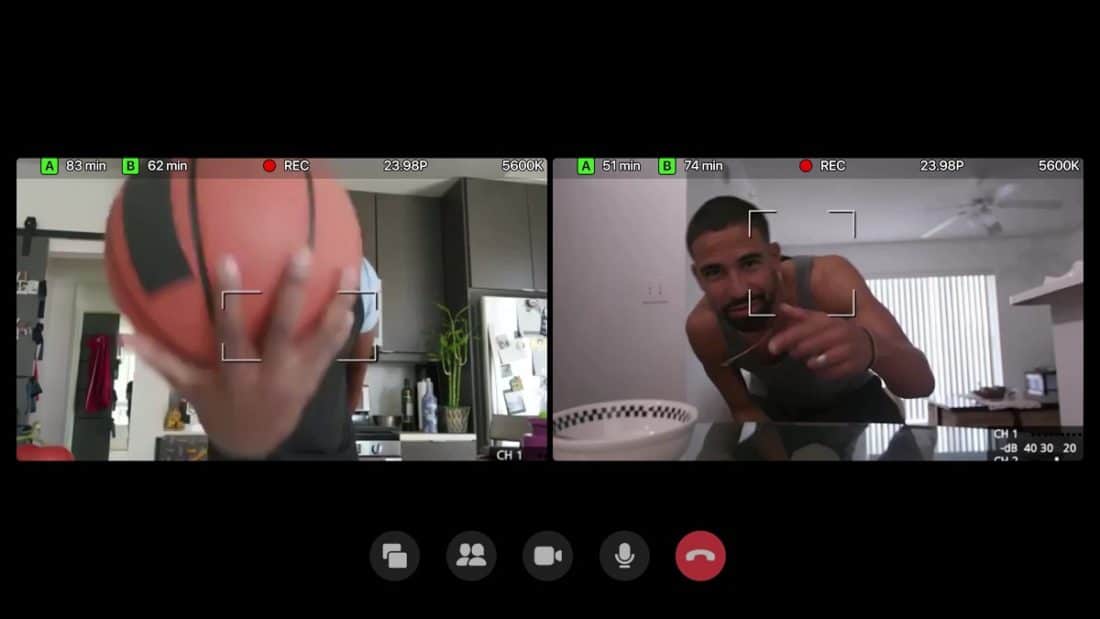In the Covid era, a little serendipity helps.
This is the first article in an ongoing series of how the Covid-19 pandemic has changed the face of advertising.
It was spring, and the pandemic was starting to spread.
A Leo Burnett team was attending a virtual meeting with Facebook executives, pitching them an idea for launching Messenger Rooms, the social media giant’s new video chat service.
“My creatives had found images of these real people,” recalls Juan Woodbury, Senior Vice President, Creative Director, and Executive Producer at Chicago-based Leo Burnett. “I called my friend and asked, ‘Are you in this group picture that we randomly found somewhere?’ Marcus is a great friend of mine. He’s a manager for a bunch of artists, including Snoop Dog.”
Yes, his friend—Marcus Majors, a talent manager at Stampede Management, dancer and actor —was the guy in the photo playing basketball with a bunch of friends. And yes, Leo Burnett hired Majors and his friends to film themselves for the TV spots that launched Facebook group messenger services to rival Zoom and Google Hangouts.
So begins the serendipitous trek of many of this year’s ad campaigns, produced in “new normal” conditions in people’s living rooms and sanitized studios.
With disease swirling around the world, the team had to find a safe way to work at the high level to which they are accustomed.
For the Facebook “Pictures” campaign, they hired a team from the upper echelons of cinema and entertainment, all of whom adopted new, virtual processes.
“We started working on a creative platform idea that would bring the amazing new product to life, which led us to ask, ‘What if we show the rooms coming from previous in-person experience?’” says Leo Burnett Executive Creative Director Adriano Matos. “When we came up with the idea, we needed an ingenious director.”
Two directors, in fact.
“We went after Michel Gondry, [who directed] Eternal Sunshine of the Spotless Mind,” Matos says. “This guy is incredible. He directed [the ad] with his brother, Olivier Gondry, a post-production master.”
Through Partizan, their Paris-based production company, the French brothers “remote directed” the 60- and 30-second spots, self-filmed by some 50 people in homes across nine states. The shoots happened over six days, with the entire process, from initial brief to the TV spot, taking two months.
Creativity is so serendipitous, in fact, that Eternal Sunshine showed up in this author’s Netflix queue a few hours after the Woodbury interview. Just as the movie cuts from characters’ real lives to dream sequences where memories are erased, the Facebook ad causes animation to move seamlessly from still shots to nine moving images filling up the quadrant of a screen.
Singer and rapper Lizzo covered “All Together Now” from The Beatles’ Yellow Submarine album, and La La Land choreographer Mandy Moore choreographed nine vogueing scenes by working virtually with all the dancers.
Woodbury and Matos oversaw the project from their respective Chicago residences while Michel worked in LA and Olivier in Paris. Instead of using a casting agent, as they would have done pre-Covid, Leo Burnett creatives scoured social media to identify photos of groups of people, then contacted them all individually to see if they’d want to reunite in the ad.
“By far, the biggest challenge was casting,” Woodbury says. “Finding the photos, then finding all the people in the photos, then coordinating these non-actors across the country for simultaneous shoots, which included some surprises and reveals so that we could capture spontaneous responses. It was a high-wire act.
“The whole gist of the campaign was to take real friends. We brought them together.”
He hired a company to send “drop kits” to each person’s home that included a Canon C300 camera and lighting equipment, all carefully sanitized. “We didn’t want anyone to get sick,” he says. “This was very new for everybody.”
Each person in the ad had to configure the equipment, with the Gondry brothers advising on set-up, lighting and other atmospherics via virtual conversations on Facebook. “Michel was directing the talent remotely, telling them what to do, how to move the camera, how to move the basketball, everything,” Woodbury says.
Jeff Buchanan, who edited the film HER starring Joaquin Phoenix, edited the ad. Special effects company The Mill did the post-production, including color correction—a critical step given that the shots were filmed by everyday people in their homes, sometimes with only candlelight.
“With Olivier being integral in the effects process, it pushed the whole team to achieve some truly magical moments,” says Glyn Tebbutt, a former creative director at The Mill who is now freelancing in LA.
“The remote shooting experience was a first for me,” Tebbutt says. “To be ‘on set’ from my kitchen was extraordinary and highlighted what is possible when everyone goes above and beyond. It was an amazing undertaking from Partizan from a logistics perspective in such challenging conditions.”
For his part, Matos marvels at how eager everyone was to try something new. He’s grateful.
“For most people, Covid-19 has been [crappy] and challenging,” he says. “I have 23 years in advertising and I’ve never done anything like what we are doing now. I’m learning a lot.”
